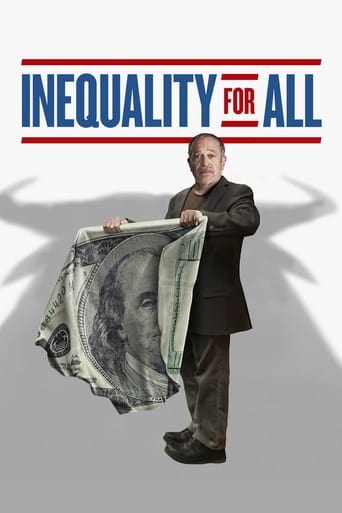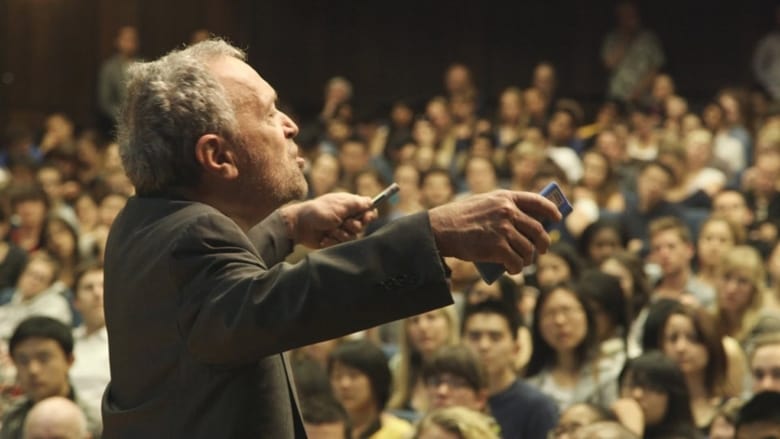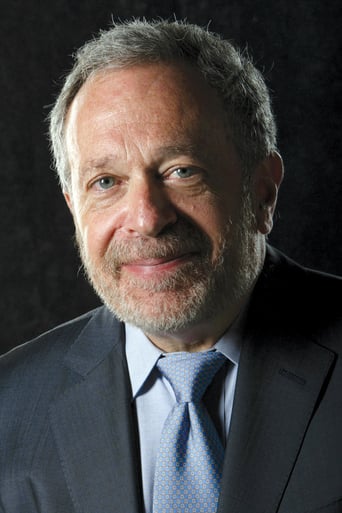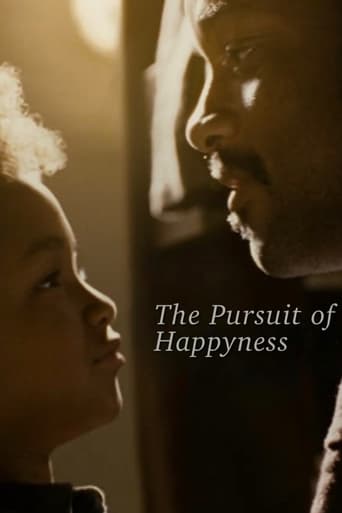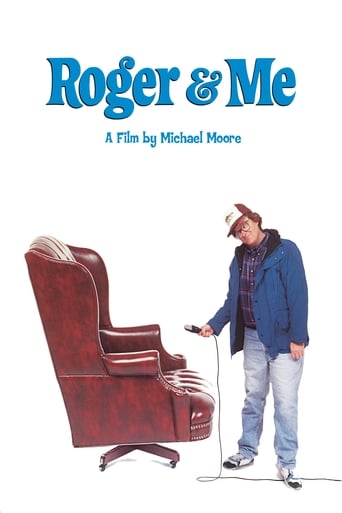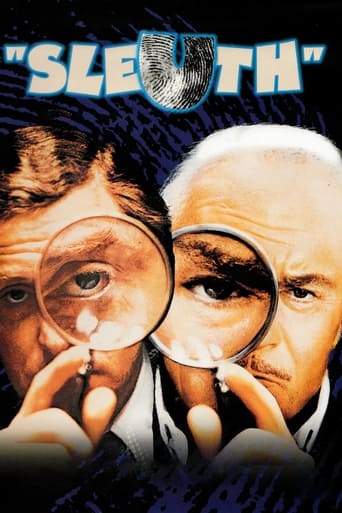Inequality for All (2013)
U.S. Labor Secretary Robert Reich tries to raise awareness of the country's widening economic gap.
Watch Trailer
Cast
Similar titles

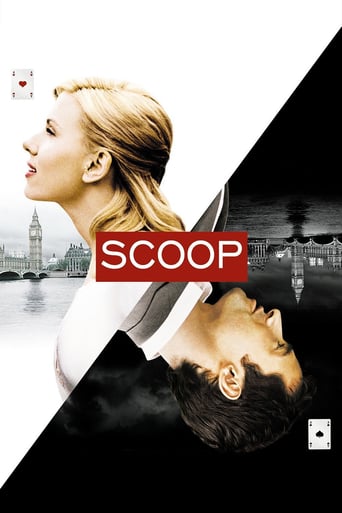

Reviews
Simply Perfect
Fresh and Exciting
It's entirely possible that sending the audience out feeling lousy was intentional
The film's masterful storytelling did its job. The message was clear. No need to overdo.
The economics seem sound and provides explanation why the middle class financial health is the key to a successful economy and solid democracy.Former Secretary of Labor, Robert Reich, explains this argument in understandable terms. Using testimony from the really rich Americans, including Warren Buffet, to everyday middle class Americans struggling to maintain their quality of life.The loss of one star is due to the web site promoting a clearly liberal agenda. The documentary itself has no political message which motivated me to go to the web site to take action. But, alas, when the web site had nothing but political elements, it turned me off.
My die-hard liberal friend told me to watch this movie, and now I know why. This movie is most certainly bi-partisan, in favor of democrats and big government.The movie starts out rather non-biased. The producer shows startling statistics and facts, which anyone would say are not good, like how CEO pay has increased substantially compared to average workers since the 50's.But then he, very biasedly, explains why this all has happened, and ways we can get out of it. His answers include taxing the rich more and electing democrats in office. The guy uses Bill Clinton in this movie like he is a prophet. He definitely is prompting not just his message, but his political agenda in this movie. Never once does he say anything negative about democrats.It's worth watching, but with a VERY open mind. #TRUMP2016
I sat down and watched this doc hoping to hear something more than typical liberal talking points. However that hope was soon dashed. If you want a feel good liberal spin of the poor and inequality than this movie is for you. If you want an honest look about the truth of inequality in this country you will leave this doc empty handed. Robert Reich tries to tie in a slew of liberal talking points together all to blame inequality on republicans with an attempted smokescreen of blaming both parties. Toward the end he stems into the occupy and tea party stances of taking the money out of politics but fails to really point blame at the democrats themselves for being there to actually accept it instead of turning it down. Instead he just blames the rich. This is a straight forward bias approach to economics as one can see. The claim that the bill clinton era economy was a strong US economy is laughable as clinton's policies (the community reinvestment act expansion) were the very roots of the cause of the economic collapse. In general the movie is a classic piece of capitalism. Don't worry about solving problems and looking at the truth, just produce what sells. The truth is there is enough blame to go around. There are some ominous points made in the doc. One involving globalism. It is not hard to understand why globalism has brought down wages. More people willing to do a job, means you can find someone to do it for less. Yet he fails to see how women entering the work force had the same effect of keeping wages down by producing more human labor. Instead linking it to a need for women to go to work to increase income. One thing is certain, wages are stagnant and ceo and the rich are getting richer. But his solution is geared more toward a political class maintaining power than it is about actually solving these issues. Left off this video is important conversations about the FED, effects of taxation on the middle and how it prevents the middle class form raising up and growing. Also left off is any real conversation about why college tuition has skyrocketed inline with the amount of money the government is willing to loan students. Also left out is how corruption in higher education and government policies for things like licenses and certification are closing out large parts of the population to employment in every protectionism schemes. There is room for a real conversation on this subject, however this doc isn't it.
Inequality for All attempts to do for income inequality what An Inconvenient Truth did for the global warming/climate change debate. Immediately, if you agree with Reich's talking points about economics and who is exactly at fault for the economic downturn of recent years, you'll likely love Inequality for All and perhaps quote its statistical data in future debates. If you don't agree with Reich's points, you'll likely wind up hating the picture, dismissing it as biased, lefty-fodder and never think about it again. In other words, it's another typical political documentary in the regard that those who really need to see it and take things away from it probably won't.That doesn't mean Reich's commentary on this particular issue should be casually dismissed and regarded as biased senselessness. Reich makes several great points in this documentary, and the film is worth seeing on the merits that he is a charismatic and very likable screen presence. The fact that Reich assumes a tone that is witty and informative without being too didactic and pompous already makes the film much more accomplished than An Inconvenient Truth. For starters, Reich's background is in economics. He has studied the field for many years and has worked under the Ford, Carter, and Clinton administrations, working as the Secretary of Labor under Clinton. To dismiss Reich's claims immediately as lefty-fodder or something along those lines is criminal just because he is at least more experienced than many people reviewing this film. I can't dismiss Reich's claims, nor can I back them up. I can simply try and view eye-to-eye with him before moving on.Reich's film instantly feels like a PowerPoint presentation, with numerous infographs, charts, video clips, montages, etc appearing with Reich narrating and stating each piece of information's significance. This style makes for a basic, but very accessible film, which is what we need in the line of documentaries concerning politics and economics. They are topics that can get alienating and complex very easily, and Reich seems to be totally aware of that. What the man winds up doing, to combat the intimidating subjects, is offer a cleanly edited film, mixing in the aforementioned ingredients with bits of his lectures at Berkeley in order to create a very interesting and thoroughly entertaining film.Probably his strongest takeaway point, even if, I feel, many of us already know this, is that a strong middle class is the key to a strong economy. One of his wealthy subjects is Nick Hanauer, a venture capitalist who makes the bold assertion that the rich do not create jobs or benefit the economy in a way that is as significant as what the middle class does. He sums this up nicely, commenting that while some people make in excess of $10 to $30 million dollars a year, paradoxically, they spend very little of it. Most of their money goes into investments or into a vault for their savings. The middle class, on the other hand, can only donate so much of their money to savings because many of them have outstanding bills that need be paid by a certain day. Hanauer also comments that America needs to forgo the failed concept of "trickle-down economics" in favor of "middle-out economics," which is the pro-business ideology to create a strong, viable middle class akin to that of the 1940's, 50's, and 60's. The question is how do we get there? Reich's other strong takeaway point is that the American "free market" isn't completely free in a large sense. For better or for worse, depending on what you believe, the government has regulated the market with countless organizations that either limit production, tell us how to produce something, and work in efforts to regulate business in a way that makes it meet certain requirements. For some, this will be old news but for others, like me, it provides a moment to truly think about. There truly is not such thing as a free-market; the only one that would exist would be under complete anarchy with no regulations whatsoever.Director Jacob Kornbluth constantly makes an effort to show how baffling and simultaneously captivating Reich can be. At one point during Reich's presentation, he asks for an audience member's iPhone and questions to the masses where most of the proceeds from each purchase of an iPhone goes to. Many guess China and the United States, two countries directly involved in the solicitation and the manufacturing of said phone. It turns out 23% goes to Japan, 6% goes to the United States, roughly 3% goes back to China, something like 17% goes to Germany, and the remaining percent is scattered across the globe. The idea is that while iPhones are manufactured in one particular place (China), the parts for manufacturing just one phone come from all over the world, leaving many countries to share the profits unevenly.While Inequality for All is a good lesson in economics, the real treat is getting to know Reich, who stands tall at just four feet, eleven inches, loves his MINI Cooper car because it feels in proportion to himself, and always brings a small wooden box to stand on wherever he goes to speak. The guy is just nine miles past adorable, and, agree or disagree with his points in the film, he has enough charisma to brighten a room and enough intelligence that everyone can take away something he says by the end of the documentary.Starring: Robert Reich. Directed by: Jacob Kornbluth.
